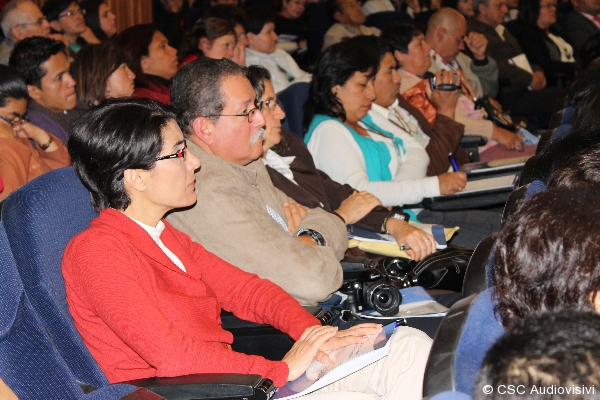 “The Technological Institute of Costa Rica is the only university in our country that specializes in the teaching of technology. In 2003 I was asked to prepare a course for training our students in the liberal arts. I entitled the course: “Cultural Alterity: A Hope For Today’s World”.
“The Technological Institute of Costa Rica is the only university in our country that specializes in the teaching of technology. In 2003 I was asked to prepare a course for training our students in the liberal arts. I entitled the course: “Cultural Alterity: A Hope For Today’s World”.
The methodology used in this course envisions education as a process of transformation in the way we live together with one another. Alterity produces freedom, which opens the possibility of always beginning again. It gives a sense of life, of inter-relatedness and of solidarity. It is based on the ability of a human being to develop an “intelligence of love” that helps to understand and promote concrete actions in favour of others: taking care of someone, tenderness, sympathy, understanding, service.
This objective is achieved through the use of traditional techniques such as lecture, theatre, film clubs, and guided reading groups where students can carry out positive actions in favour of others.
To achieve this we use traditional techniques such as lecture, theatre, film clubs, guided reading group, where young people reflect on current and how they can make positive actions for others. The course consists of 4 modules of 3 hours per week. The course is comprised of four three-hour long modules each week. More than a thousand students have already attended. Outside the classroom, the students put into practice what they are learning and, at during the next class they share report how it went.
One student began to practice a culture of alterity by dedicating time to her younger sister who has been affected by Down Syndrome: they spoke, went to the cinema together, to a dance, to eat at a restaurant; and she found her sister to be an intelligent person, whose tastes were similar to her own, someone who it was nice to be with.
 Another reports: “I was on the bus, sitting, when a woman mounted the bus, carring many bundles. At first I didn’t want to give her my seat because I was tired, but then I recalled that I had decided to put into practice what I had learned in class, and I let her have my seat. We dismounted the bus at the same place and, since it was raining, I accompanied her home with my umbrella, helping her with her bags. I was happy and so was she, even inviting me in and offering me a cup of coffee. From then on, we have been friends.”
Another reports: “I was on the bus, sitting, when a woman mounted the bus, carring many bundles. At first I didn’t want to give her my seat because I was tired, but then I recalled that I had decided to put into practice what I had learned in class, and I let her have my seat. We dismounted the bus at the same place and, since it was raining, I accompanied her home with my umbrella, helping her with her bags. I was happy and so was she, even inviting me in and offering me a cup of coffee. From then on, we have been friends.”
One group went to a hospice. There was one boy who had this to say one week after the experience: “I didn’t want to go because I feel uncomfortable around the elderly, but I went in order to accept the challenge of living a culture of alterity, there where it cost me the most. At first it was difficult, but watching my classmates gave me courage. It was so beautiful and I felt a fullness and happiness that was so great that the same day I didn’t need to take any drugs to get high, as I sometimes do.”
This educational proposal also seeks to give an answer to the many dimensions of the current crisis that our country is passing through: economic, political, social, cultural and environmental. And so we are examining the Economy of Communion Project, the experience of Politics of Unity, Art in Communion and the protection of the environment.”
(Testimony given at an international Symposium on Fraternity, 4 April 2012, at l’Università Manuela Beltrán di Bogotá. Giancarlo Faletti , co-president of the Focolare Movement, was present).
Paulina Segura graduated in Anthropology and has a doctorate degree in Pedagogical Mediation. She is trained in different areas of tourism and Education, has done many projects in Social Research. She teaches at the Catholic diocesan seminaries and in other universities in Costa Rica.




0 Comments